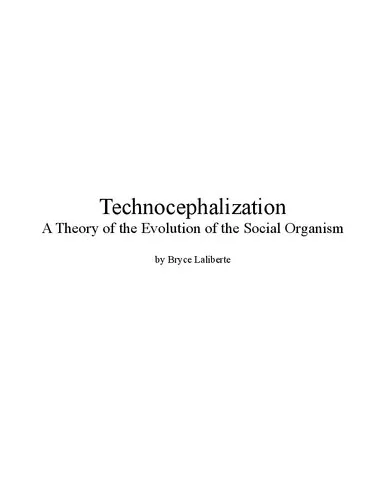Technocephalization: A Theory of the Evolution of the Social Organism
4.7
Reviews from our users

You Can Ask your questions from this book's AI after Login
Each download or ask from book AI costs 2 points. To earn more free points, please visit the Points Guide Page and complete some valuable actions.Introduction to 'Technocephalization: A Theory of the Evolution of the Social Organism'
In an era marked by rapid technological advancement and societal change, "Technocephalization: A Theory of the Evolution of the Social Organism" explores the intricate interplay between technology and society. This book provides a comprehensive analysis of how technological progress influences the evolution of social structures and the human experience.
Detailed Summary of the Book
In "Technocephalization," the concept of society is envisioned not merely as a network of individuals but as an organic system poised for evolution. The term 'technocephalization' is coined to describe the head-like concentration of technological capabilities driving the social organism. This analogy allows us to envision society as a living entity where technology acts as a neural network, facilitating communication, decision-making, and problem-solving on large scales.
The book delves into several key themes: the pace of technological change, its role in reshaping social norms, and its potential to enhance collective intelligence. The narrative spans from the industrial revolution to the digital age, providing insights into how each technological leap has redefined human interaction and societal evolution.
Chapter by chapter, the book investigates various dimensions of this evolution, including economic structures, governance, cultural shifts, and ethical considerations. It questions not just how society has adapted to technology, but also how technology has become embedded in the very fabric of societal growth and transformation.
Key Takeaways
- The concept of 'technocephalization' reframes our understanding of the relationship between society and technology, suggesting that as technology becomes more centralized and integrated, society achieves new levels of functionality.
- Technological progress has been a crucial driver of social evolution, influencing everything from economic systems to cultural norms.
- While providing numerous benefits, the integration of technology into social systems also raises ethical issues and challenges that need to be addressed to ensure a healthy balance.
- The future of society, as mapped out in the book, hinges on how effectively we can harness technology's potential to enhance human experience and collective intellectual capacity.
Famous Quotes from the Book
"What we are witnessing is not just the evolution of technology, but a transformation of society into a more interconnected, intelligent organism."
"Technology is the nervous system of our social organism; it processes, directs, and sometimes even defines our collective actions."
"In the digital age, adaptation is not merely a choice but a fundamental necessity for the survival of the social organism."
Why This Book Matters
"Technocephalization" is significant for readers who seek to understand the dynamic relationship between technology and society. It provides a theoretical framework that challenges traditional perceptions, offering a new perspective on how societies are evolving. By examining the past, the book sheds light on current trends and potential futures, equipping individuals, policymakers, and thinkers with the insights needed to navigate the complexities of a technologically-driven world.
For those engaged in technology, sociology, anthropology, or ethics, this book is an essential guide to understanding the transformations unfolding in society today. It speaks to the global narrative of progress, innovation, and the challenges that accompany them, urging readers to consider not only the possibilities but also the responsibilities that come with the evolution of our social organism.
Free Direct Download
You Can Download this book after Login
Accessing books through legal platforms and public libraries not only supports the rights of authors and publishers but also contributes to the sustainability of reading culture. Before downloading, please take a moment to consider these options.
Find this book on other platforms:
WorldCat helps you find books in libraries worldwide.
See ratings, reviews, and discussions on Goodreads.
Find and buy rare or used books on AbeBooks.
1273
بازدید4.7
امتیاز50
نظر98%
رضایتReviews:
4.7
Based on 0 users review
"کیفیت چاپ عالی بود، خیلی راضیام"
Questions & Answers
Ask questions about this book or help others by answering
No questions yet. Be the first to ask!


